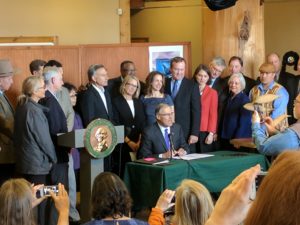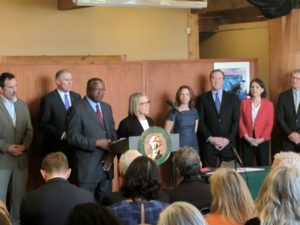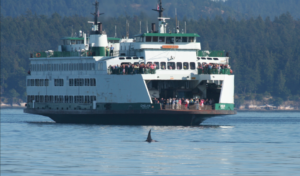Governor Inslee signs Executive Order 18-02: southern resident killer whale recovery and task force
Today (3/14/18) in Seattle, Governor Jay Inslee signed Executive Order 18:02, setting the stage for Washington State agencies to implement immediate actions to benefit the southern resident killer whales, (aka SRKWs) — an endangered population of salmon-eating orcas. The order also creates a SRKW Task Force which will guide “implementation of a longer-term action plan.”
A highlight moment (for me at least) came as Inslee approached the table to sign the order. He suddenly stopped short and went into a crouch, looking through the glass front doors of the Daybreak Star Cultural Center from our vantage point high up in Discovery Park and squinting as if he’d just noticed something on the northern horizon where the tourmaline waters of Puget Sound sparkled. Then he said this:
Audio Player“Oh my gosh! It’s J pod, right out there!!” Then he sat down chuckling, signed the order, and then turned to his backers to say “Get to work!”
Prior to the signing, the governor spoke about his inspiration — hearing killer whale blows in the fog as a boy — and other regional leaders expressed their support for the order. In addition to a Native song from two brothers which echoed majestically through the Daybreak Star Center, speakers included Chairman of the Suquamish Tribe –Â Leonard Forsman, Vice-Chair of the Puget Sound Partnership (PSP) Leadership Council — Stephanie Solien, and retired President of Evergreen State College — Lee Purce. The latter two, Solien and Purce will co-Chair the new Task Force. See below for video/audio recordings.
“We know there are multiple threats to the orca, not just one…. None of these threats can be taken lightly. The stakes are too high to wait any longer. And all of them need to be addressed. There is no one panacea for the orcas. Everyone in the State of Washington has some role to play in this…. The orca will not survive unless all of us in the State of WA somehow makes a commitment to their survival.”
Video/audio recordings of the speakers
Opening song by Jewel and Doug James
The signing ceremony was opened with a prayer sung by renowned totem pole carver Jewel James, joined by his brother Doug James, both of the Lummi Tribe. Governor Inslee thanked them for “helping us move forward in the spirit of Bernie Whitebear.”
Leonard Forsman, Chairman of the Suquamish Tribe
Hilary Franz, Commissioner of Public Lands
Stephanie Solien, Co-chair of the Task Force
Introduction of her speech (switched from video to audio due to storage constraints…):
Latter portion of Solien’s speech:
Audio PlayerLee Purce, Co-chair of the Task Force
Audio PlayerImmediate actions in a nutshell
“Immediate actions” means during 2018, with some implemented as soon as the end of next month (April). You can read the full details in the PDF of the Executive Order, but in a nutshell they are:
- By April 30:
- more enforcement of vessel and fishing regs in orca areas (WDFW and WA State Parks and Rec. Comm.)
- curriculum to train whale watch vessels to assist during oil spills (Dept. of Ecology)
- adjust 2018 recreational and commercial fishing regs to get SRKW more prey (WDFW)
- reduce PCBs in food used by state salmon hatcheries
- By May 31: develop strategies for quieting ferries in SRKW areas (WSDOT)
- By July 1: prioritize existing outreach resources & develop pubic ed program (PSP, WDFW, GSRO, SWPRC, DOL)
- By July 31:
- identify marine areas and watersheds where actions could get more prey to SRKWs (WDFW with Governor’s Salmon Recover Office [GSRO] and PSP)
- prioritize SRKW benefits in ranking 2019-2021 storm water projects (Dept. of Ecology)
- By December 15: consider benefits to SRKWs in assessing Chinook recovery projects (PSP, WDFW, GSRO)
Synopsis of the Task Force
The main goal of the Task Force will be to formulate a longer-term action plan that addresses major threats to the SRKWs. With a broad membership and in collaboration with many other plans and entities (in the U.S. and Canada), the group will first report to the Governor by November 1, 2018.
Concluding thoughts
This is all very welcome news from the State of Washington for the orcas whose population is at a 20 year low, especially in an era when U.S. Federal funding for SRKW recovery (research and outreach) has run dry and shows no prospect of renewal. Last month the Trump administration proposed to reduce NOAA’s 2019 budget by 20%, or about $200M. Ironically, in his speech (at 6:19) Inslee mentions the same sum — $200 million — as the amount that the State “is investing this biennium in capital funding for salmon recovery and habitat restoration projects.”
This most-progressive corner of the U.S. may yet save its regional icons, ideally in partnership with the progressive leaders in Canada fueled by their Federal Ocean Protection Plan, but it will likely also take some luck and the proper spirit — keeping in mind our oneness with each other and the orcas, as well as the the long-term prospects for the Salish Sea Ecosystem.






 Twitter
Twitter LinkedIn
LinkedIn Facebook
Facebook